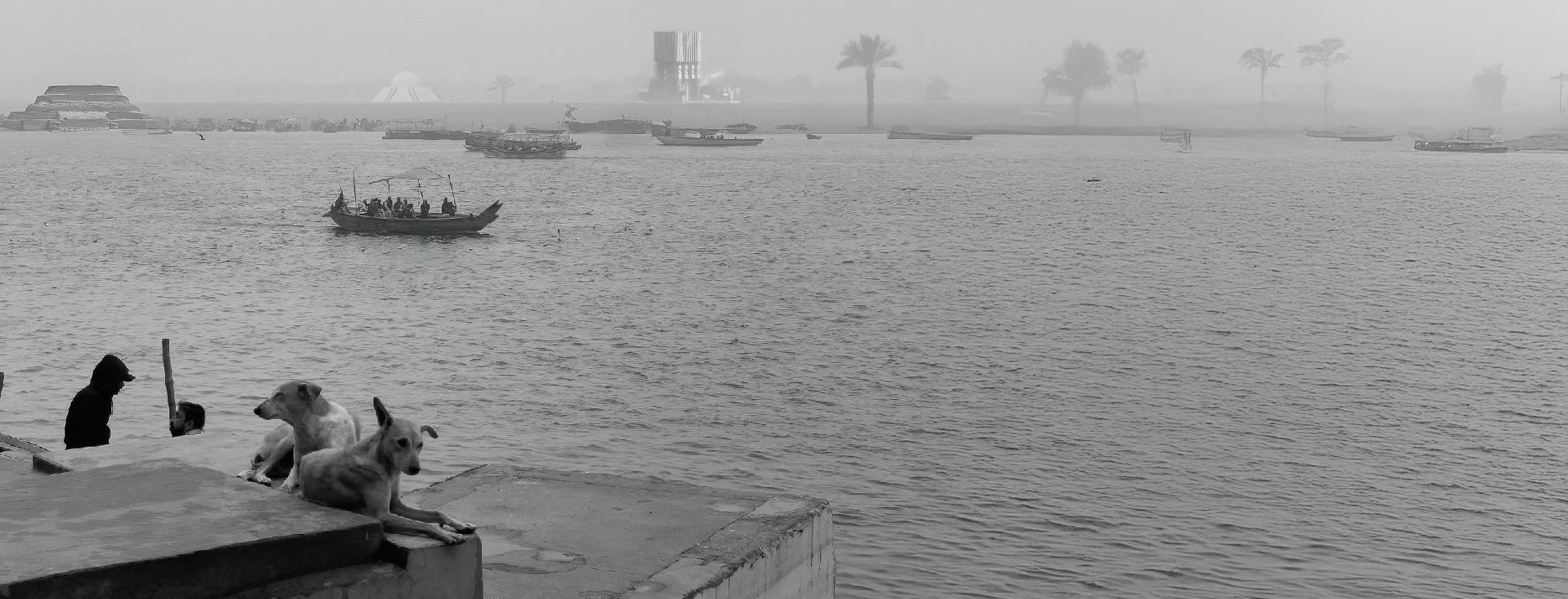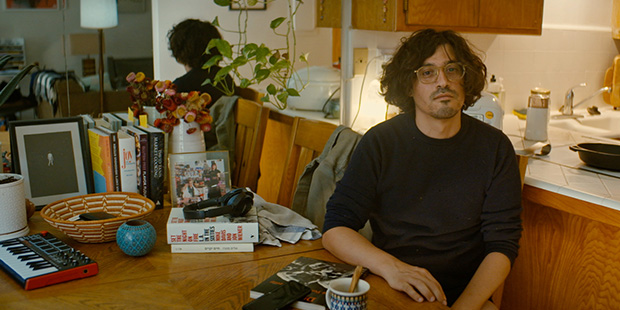Even a Dog in Babylon

An alternate present, unearthed from ancient ruins
Project type: Fiction Feature
Project status: Development
Co-Writer/Director: Lior Shamriz
Co-Writer: Matt Polzin
Co-Producer: Mahshid Modares
Co-Producer: Azad Azizyan
Composer: Ohal Grietzer
CGI Consultant: Alexander Porter
Email: film@evenadoginbabylon.com
Website: evenadoginbabylon.com
Facebook: @spektakulativpictures
Instagram: @spektakulativ_pictures
Help independent filmmakers tell their stories.
Make a donation to Even a Dog in Babylon today.
Film Independent’s Fiscal Sponsorship program opens the door to nonprofit funding for independent filmmakers and media artists. Donate today and help bring Even a Dog in Babylon to life.
Logline
Set in an alternate West Asia never colonized by European powers, Even a Dog in Babylon tells the story of Jamshid, a young man from Shiraz, Iran, who is recruited to work on a VR game that simulates alternate realities, including uncanny visions of “our” world: displacement, violence, and borders.
Synopsis
Even A Dog In Babylon is a speculative hybrid fiction/documentary set in an alternate 21st-century West Asia, where Britain and France never colonized the region and Mizrahi Jewish communities remain rooted in Iraq, Iran, Syria, and elsewhere. Jamshid, a quiet young man from Shiraz, is growing bored with working at the family fabric store. When his cousin Sarmad, a tech developer, asks him to beta-test a VR program that simulates alternate realities based on genetic heritage and speculative history, Jamshid sees uncanny visions of “our” world: wars of displacement, and borders cutting through the region.
Soon after, Jamshid becomes fascinated with Souheil, a mysterious stranger whom he photographs by chance outside of his family’s store. After catching Souheil stealing an ancient Babylonian tablet from a nearby shop, Jamshid impulsively protects him from police scrutiny. The theft turns out to be politically motivated—connected to a youth movement centered around the recently excavated “Dawn Temple” near Nippur, a site that some claim holds the key to a pre-monotheistic past.
Jamshid is offered a position as a field photographer for WSR. Once he gets to Nippur, he learns that young people have drifted from all over the region and set up camp there, inspired by the archaeological discoveries to experiment with Neo-Mesopotamian culture. It is there that Jamshid runs into Souheil again.

Meet the Filmmakers
Lior Shamriz — Director
Born in Ashkelon on the East Meditarrenean to an Iraqi-Jewish mother and an Iranian-Jewish Father, Shamriz creates films, installations, music, and writes. They’re currently based in Oakland, California. Shamriz’s oeuvre includes feature-length independent/experimental narrative films, many short experimental fiction films, and essay and documentary films. Their work was featured at the Berlinale (2010,13,15), Locarno IFF, Sarajevo IFF, MoMA’s New Directors / New Films, BAFICI, Frameline, MixNYC, Torino IFF, Outfest Los Angeles, and exhibited at KW Berlin, MMCA Korea, NGV Australia, among many other venues and festivals. They won awards at Oberhausen Kurzfilmtage (2013,14,15), and received retrospectives by the Thessaloniki International Festival (2012), Ars Independent Katowice (2012), SteakCinema Seoul (2021), and the Berlin Art Film Festival (2015), among others.
Matt Polzin — Co-Writer
Matt Polzin is a PhD candidate in Creative Writing at the University of California, Santa Cruz. His writing has appeared or is forthcoming in Chicago Quarterly Review, Indiana Review, and Third Coast Magazine, and the feature film that he co-wrote, Estuaries, premiered at Frameline Film Festival. Originally from Michigan, he currently lives in Oakland, CA
Mahshid Modares — Co-Producer
Mahshid Modares (she/her) is a PhD candidate, documentary filmmaker, researcher, and educator. She studied visual arts at Azad University, Tehran (B.F.A.); Art History and Visual Culture at San Jose State University (M.A.); and Social Documentation at UCSC (M.F.A.). She has published several articles, book reviews, art exhibition reviews, and a curriculum resource for teaching K-12 students about Iranian arts and architecture. Her publications are available on academia.edu.
Azad Azizyan — Co-Producer
Kurdish-American documentary filmmaker, Azazyan pushes the boundaries of the documentary genre to represent the experiences and emotions of its participants. My works involve collaborating with artists in all parts of Kurdistan and the diaspora to reflect on Kurdish memory and how it has been passed through oral history from one generation to the next. Additionally, I work with Kurdish film festivals worldwide to introduce Kurdish Cinema to non-Kurdish audiences.
Ohal Grietzer — Composer
Ohal is a composer, performer, and mixed-media artist, working across a wide range of contexts including film scoring, sound installation, and research. Their work is concerned with consciousness, and its inherent vulnerabilities and sequential failures as it vacillates between forces of causation and chaos. Featured in WIRE and Fader Magazine for their solo and film score releases, their compositions have been commissioned by entities such as Akademie Der Künste, Brooklyn Academy of Music, Volksbühne Theater, and presented at venues worldwide including Berlinale, Center Pompidou, MoMA PS1, and Fridman Gallery.
Alexander Porter — Computer Effects Consultant
Alexander Porter is an Emmy-winning immersive director, documentarian, and an inventor and designer behind the most widely used software for volumetric video production. Alexander creates documentaries and interactive art. A recent project, Truth or Consequences (Rotterdam, 2020), is a speculative documentary about the town nearest the world’s first commercial spaceport, comprising a film, a local film festival, and a bespoke virtual cinematography tool. Alexander founded Specular, an art collective merging speculative design with software development creating art and real software tools. Specular’s interactive work showed at MoMA, Museum of Art & Design, Sundance and Tribeca Film Festival and others. One of its speculative projects led to founding the software startup Scatter, raising venture capital and building the world’s first volumetric production tool, Depthkit. Recent VR credits include The Changing Same (Sundance, 2021), directing Blackout (Tribeca Storyscapes, 2017), director Styles & Customs in collaboration with DIS (Carnegie Museum of Art, 2017). Alexander was nominated for a Cinema Eye Award for Alex Gibney’s Zero Days (Berlin, 2016), won an Emmy for Zero Days VR (Sundance, 2017), and a few Webby awards. Other credits include Love Child (Sundance, 2014), Clouds (Sundance, 2014). Alexander is a lecturer at Johns Hopkins, having taught previously at NYU’s ITP.
Make a donation to Even a Dog in Babylon.
Contact
For inquiries, please contact fiscalsponsorship@filmindependent.org.